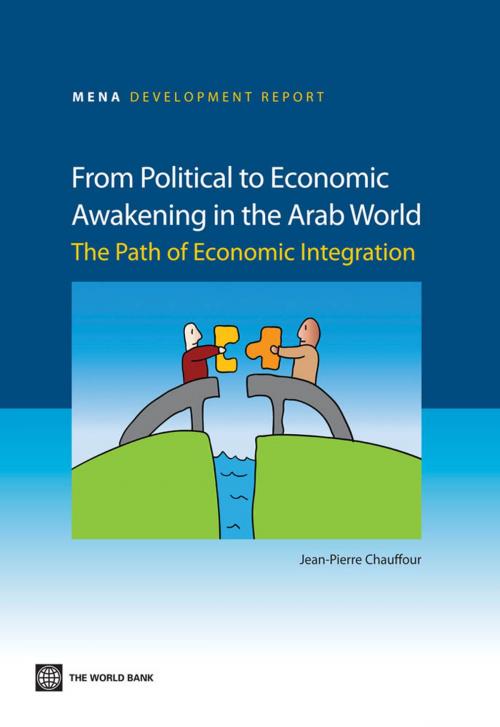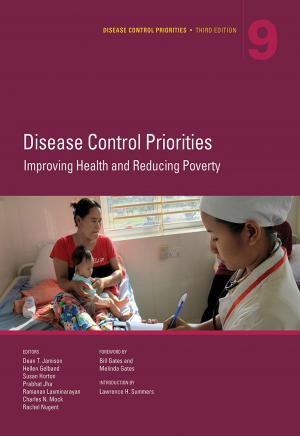From Political to Economic Awakening in the Arab World
The Path of Economic Integration
Business & Finance, Business Reference, Government & Business, Economics, Sustainable Development, Economic Conditions| Author: | ISBN: | 9780821396704 | |
| Publisher: | World Bank Publications | Publication: | December 5, 2012 |
| Imprint: | Language: | English |
| Author: | |
| ISBN: | 9780821396704 |
| Publisher: | World Bank Publications |
| Publication: | December 5, 2012 |
| Imprint: | |
| Language: | English |
The popular grievances that have fueled the Arab Spring since 2010 demonstrate that past development paradigms have failed to achieve the inclusive and sustainable growth expected by Arab populations. Countries in the Middle East and North Africa (MENA) region have failed to develop a strong private sector that is linked with global markets, survives without state assistance, and generates productive employment for young people. One key symptom of this maldevelopment is that, with the exception of the petroleum sector, MENA remains the least trade-integrated region in the world. The Deauville Partnership, launched by the Group of Eight (G8) in Deauville, France, in May 2011, is thus strategic and timely. At the request of the G8, this report provides an analytical framework for increasing trade and foreign direct investment (FDI) for Egypt, Jordan, Libya, Morocco, and Tunisia (the “Partnership countries”). Increased trade and FDI is a key means by which Partnership countries can achieve a path of sustainable growth that reduces youth unemployment. Moreover, trade and investment can also show short-term results. The G8 countries, Turkey, the Gulf states, and other Deauville partners can help the new Arab democracies achieve their objectives in two main ways: by effectively expanding market opportunities and by supporting domestic regulatory reforms. To start implementing a long-term vision of increased trade and investment integration, based on an integrated economic space in the Mediterranean basin, the Deauville Partnership could focus on five priority areas. These are helping Partnership countries adapt to a fast-changing trade, FDI, and jobs landscape; improving market access opportunities and market regulations; fostering competitiveness, diversification, and employment; facilitating trade and mobilizing trade finance and diaspora resources; and promoting inclusiveness, equity, and sustainability of the structural transformation brought about by the process of integration. The success of the Arab political awakening will greatly depend on the emergence of such an economic awakening that can generate quality employment for the millions of young Arab men and women who seek jobs and a decent life.
The popular grievances that have fueled the Arab Spring since 2010 demonstrate that past development paradigms have failed to achieve the inclusive and sustainable growth expected by Arab populations. Countries in the Middle East and North Africa (MENA) region have failed to develop a strong private sector that is linked with global markets, survives without state assistance, and generates productive employment for young people. One key symptom of this maldevelopment is that, with the exception of the petroleum sector, MENA remains the least trade-integrated region in the world. The Deauville Partnership, launched by the Group of Eight (G8) in Deauville, France, in May 2011, is thus strategic and timely. At the request of the G8, this report provides an analytical framework for increasing trade and foreign direct investment (FDI) for Egypt, Jordan, Libya, Morocco, and Tunisia (the “Partnership countries”). Increased trade and FDI is a key means by which Partnership countries can achieve a path of sustainable growth that reduces youth unemployment. Moreover, trade and investment can also show short-term results. The G8 countries, Turkey, the Gulf states, and other Deauville partners can help the new Arab democracies achieve their objectives in two main ways: by effectively expanding market opportunities and by supporting domestic regulatory reforms. To start implementing a long-term vision of increased trade and investment integration, based on an integrated economic space in the Mediterranean basin, the Deauville Partnership could focus on five priority areas. These are helping Partnership countries adapt to a fast-changing trade, FDI, and jobs landscape; improving market access opportunities and market regulations; fostering competitiveness, diversification, and employment; facilitating trade and mobilizing trade finance and diaspora resources; and promoting inclusiveness, equity, and sustainability of the structural transformation brought about by the process of integration. The success of the Arab political awakening will greatly depend on the emergence of such an economic awakening that can generate quality employment for the millions of young Arab men and women who seek jobs and a decent life.















